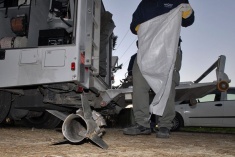
Simply speaking to residents makes one understand that the Israelis of this region live in fear for 24 hours a day, seven days a week — even on days where there are only three rocket attacks.
Every day errands like buying food in the supermarket or mailing letters at the post office have become routines of terror and fear, as they are punctuated by Tzeva Adom sirens and rocket barrages.
This Sunday morning is a perfect example. I am standing in the check-out aisle at a local Sderot supermarket when the Tzeva Adom goes off. All the customers and co-workers race to the shelter at the back of the store. We are some 25 people crammed into a tiny shelter, counting the seconds after we hear the boom. An old lady complains that she can’t continue to run like this. The manager of the store tries to calm everyone down. When it is safe, we come out cautiously, awaiting the next siren and the next rocket explosion. I have never shopped in fear like this before.
The next stop is the post office, where I mail a package to my family in Maine. During the 30-minute wait, the alert sounds twice. Once again, the same panicked rush to the shelter. A few seconds later we hear the rocket explosions.
I spend the next few hours with our camera and video crew photographing and filming the rocket attacks, during which time the terrorists in Gaza fire a rocket toward Nir Am, a neighboring kibbutz. We find the rocket buried deep in the backyard of a home, just a few meters away from actually hitting the building. A group of kibbutzniks gather nearby and an elderly lady, Chana, tells me she was in her home when she heard the rocket explosion. “The explosion was so loud, that I thought that the rocket landed in my own yard,” she says. “We were fortunate this time — no one was hit and no building damaged. But what will happen next time?” asks Chana.
Meanwhile, the rocket routine back in Sderot is interrupted by a visit from Silvan Shalom, his wife Yehudit and Maccabi Tel Aviv representative Roni Mane. A crowd has gathered in the center square of Sderot to hear the visitors speak.
The three have come to support the people of Sderot as MK Shalom endorses a new bill to help small businesses in Sderot and other surrounding towns that have been hit by Qassams. The Maccabi representative also promises that a new basketball stadium will be built for Sderot residents and their children “to keep Sderot children off the street.”
One Sderot father, clearly distraught, interrupts, stating that most Sderot children do not play on the streets anyhow “because the Qassam rockets have forced parents to keep their children inside for more than a year now.”
The politicians speak, the camera crews film and the people of Sderot continue living in a rocket circus as visitors come and go.
In the evening, I debate whether to spend the night in Sderot or at a friend’s house in kibbutz Nir Am. It has been a long day at work,; 40 or more Qassams have been fired at Sderot and the western Negev, along with three grad Katushya missiles at Ashkelon. As I am pulling out money from the ATM machine, another Tzeva Adom goes off. I find myself far away from any bomb shelter so I take cover near a stone wall nearby along with a couple of other men. We wait as the whistle of the rocket can be heard overhead and the loudest explosion of the day occurs yet. The rocket hits an electricity line, causing a blackout in the city for a few minutes.
I am dazed and shocked as the night sky lights up with the yellow sparks of the electricity pole. At that moment, I choose to sleep at Kibbutz Nir Am.
Of course, Kibbutz Nir Am is not that much safer from the Qassam rockets than Sderot, and neither is Ashkelon, as the city has now experienced the rain of grad Katushya rockets, with one falling close to the home of Israeli Internal Security Minister Avi Dichter last week. Dichter warned back in December 2007 that the rocket fire from Gaza will threaten up to 250,000 Israelis living in the region including the cities, Ashkelon, Qiryat Gat, Netivot and numerous other towns and kibbutzim.
As the war continues in the south, I wonder just how long it will be before the rockets reach Tel Aviv and central Israel. The rocket circus that the Palestinian terrorists have set up from Gaza is bound to include other major Israeli targets in the show sooner rather than later.












